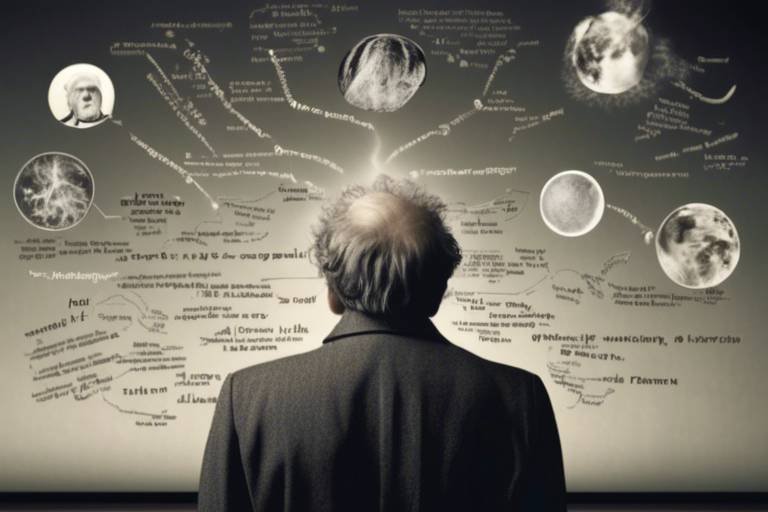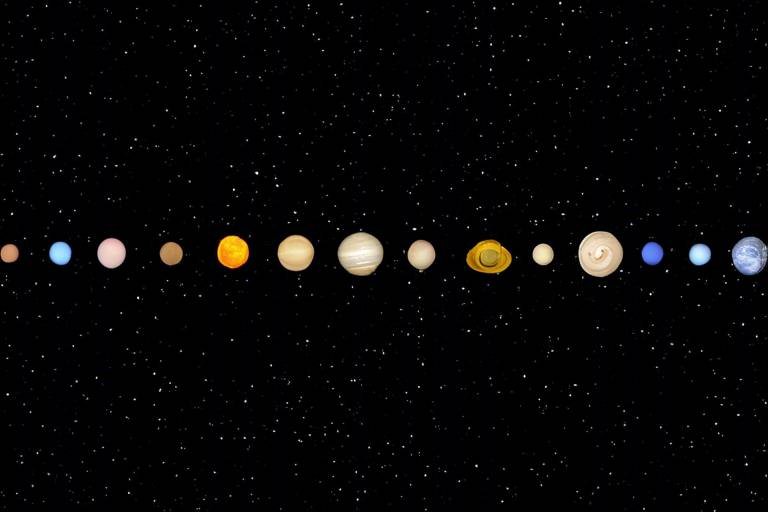Does the Scientific Community Need Philosophers?
The relationship between science and philosophy is often viewed as a complex tapestry woven from threads of inquiry, ethics, and understanding. At first glance, one might think that scientists, with their lab coats and empirical methods, operate in a world far removed from the abstract musings of philosophers. However, this perception couldn't be further from the truth. In reality, the scientific community does indeed need philosophers, and here's why. Philosophers play a crucial role in shaping scientific inquiry, guiding ethical considerations, and helping us grapple with the broader implications of scientific discoveries. They serve as the navigators in the vast ocean of knowledge, ensuring that we don't just sail aimlessly but instead chart a course that is both informed and responsible.
To understand this relationship better, we must first delve into the role of philosophy in science. Philosophy provides a foundational framework for scientific inquiry, helping to clarify concepts, assumptions, and methodologies that underpin scientific research. It's like having a map that highlights not just the destination but also the various routes one can take to get there. Without this philosophical grounding, scientific research could easily become a chaotic endeavor, lacking direction and coherence. Philosophers encourage scientists to question their own methodologies and assumptions, fostering a culture of critical reflection that is essential for genuine progress.
Moreover, the ethical landscape of scientific research is increasingly complex, and this is where philosophers shine. They contribute significantly to the ethical considerations of scientific practices, guiding researchers in navigating moral dilemmas and the societal implications of their work. Imagine a scientist on the brink of a groundbreaking discovery that could potentially alter the course of humanity. Without ethical guidance, the scientist might be tempted to pursue their research without considering the consequences. Philosophers help illuminate these moral pathways, ensuring that scientific advancements align with societal values and ethical standards.
Examining historical perspectives reveals how philosophers have influenced scientific thought throughout the ages. Think of the likes of Aristotle, Galileo, and Descartes, who not only advanced scientific knowledge but also posed fundamental questions about the nature of reality, knowledge, and existence. Their inquiries laid the groundwork for modern scientific methodologies. This ongoing dialogue between philosophy and science underscores the evolution of scientific thought and highlights the necessity of philosophical insight in understanding the implications of scientific discoveries.
In this context, identifying key philosophers and their contributions can illustrate the critical intersection of these fields. Figures such as Karl Popper, who introduced the concept of falsifiability, and Thomas Kuhn, known for his work on paradigms in science, have profoundly shaped our understanding of scientific progress. Their ideas challenge scientists to think critically about their work and its implications, reinforcing the idea that philosophy is not merely an abstract discipline but rather a vital component of scientific inquiry.
Furthermore, analyzing specific case studies can demonstrate how philosophical ethics inform and shape the conduct of scientific research. For instance, the ethical debates surrounding genetic engineering and artificial intelligence highlight the importance of philosophical discourse in guiding scientific exploration. By examining these case studies, we can see how philosophical principles ensure accountability and responsibility in scientific practices, ultimately benefiting society as a whole.
As we explore the philosophy of science, we find that it examines the methods, foundations, and implications of scientific inquiry. This branch of philosophy prompts scientists to reflect on their practices and the nature of scientific knowledge itself. It's akin to looking in a mirror; philosophers help scientists see not just what they are doing, but why they are doing it and what it means in the grand scheme of things.
However, despite these clear connections, philosophers often face challenges when engaging with the scientific community. Skepticism about their relevance and the practical application of philosophical insights can create barriers to collaboration. Yet, bridging the gap between philosophy and science can lead to fruitful partnerships, fostering a deeper understanding of both fields and their interconnectedness.
Looking ahead, exploring future directions for the relationship between science and philosophy can enhance interdisciplinary collaboration. This collaboration can enrich both fields, ultimately benefiting society as a whole. As scientific advancements continue to accelerate, the need for philosophical insight becomes ever more critical. The dialogue between these disciplines must evolve, embracing the complexities of modern science while remaining grounded in ethical considerations and reflective inquiry.
- Why is philosophy important in scientific research? Philosophy provides critical frameworks that help clarify scientific concepts, ensuring that research is coherent and ethically sound.
- How do philosophers influence scientific ethics? Philosophers guide researchers in navigating moral dilemmas and understanding the societal implications of their work.
- Can science exist without philosophy? While science can operate independently, philosophical inquiry enriches scientific exploration by prompting deeper reflection on methodologies and implications.
- What are some historical examples of philosophers impacting science? Philosophers like Aristotle and Kuhn have shaped scientific methodologies and our understanding of scientific progress through their inquiries.

The Role of Philosophy in Science
When we think about science, the first things that often come to mind are experiments, data, and groundbreaking discoveries. But what if I told you that there’s a hidden backbone to all this—a framework that shapes how we think about these scientific endeavors? That’s where philosophy steps in. Philosophy is not just an abstract discipline; it acts as a guiding star, illuminating the path of scientific inquiry by clarifying concepts, assumptions, and methodologies that underpin research.
Imagine trying to build a house without a solid foundation. You could have the best materials and the most skilled workers, but without that base, everything could come crashing down. Similarly, philosophy provides the foundational principles that support scientific exploration. It challenges scientists to examine the very essence of what they are studying. What does it mean to say something is “true”? How do we define “knowledge”? These are the types of questions philosophers tackle, and they are crucial for scientists to consider as they formulate hypotheses and interpret their findings.
Moreover, philosophy encourages a critical examination of the methods used in scientific research. For instance, the scientific method—a systematic approach to inquiry—was itself born from philosophical thought. Philosophers like Karl Popper introduced the idea of falsifiability, which asserts that for a theory to be considered scientific, it must be testable and refutable. This principle has become a cornerstone of scientific practice, urging scientists to design experiments that can potentially disprove their theories rather than merely seeking to confirm them.
Additionally, philosophy plays a pivotal role in the interpretation of scientific results. Once the data is collected, it’s not just about what the numbers say; it’s about what they mean. Philosophers help scientists navigate the murky waters of interpretation, guiding them to consider the broader implications of their findings. For example, when a new drug is developed, it’s not enough to know that it works; we must also ponder the ethical implications of its use, the societal impact it may have, and how it fits into the larger tapestry of healthcare. This is where the collaboration between philosophy and science becomes not just beneficial but essential.
So, how do we see this relationship manifest in practical terms? Here are a few ways in which philosophy intersects with science:
- Clarifying Definitions: Philosophers help define key terms like “life,” “consciousness,” and “intelligence,” which are critical in fields like biology and artificial intelligence.
- Challenging Assumptions: They question the underlying assumptions that scientists may take for granted, prompting a deeper investigation into the validity of those beliefs.
- Exploring Consequences: Philosophers analyze the potential consequences of scientific advancements, ensuring that we consider the ethical dimensions of our discoveries.
In conclusion, the role of philosophy in science is not merely supportive; it is integral to the very process of scientific inquiry. By providing a framework for understanding complex concepts and ethical considerations, philosophy enriches scientific practice and ensures that we not only pursue knowledge but also reflect on its implications. As we continue to make advancements in various scientific fields, the dialogue between philosophy and science will remain essential, steering us toward a more profound understanding of our world.

Ethics in Scientific Research
When we dive into the realm of scientific research, we often find ourselves grappling with complex ethical questions. What responsibilities do scientists have towards their subjects? How do we balance the pursuit of knowledge with the potential for harm? These dilemmas are where philosophy steps in, acting as a guiding compass for researchers navigating the often murky waters of ethical considerations.
Philosophers play a crucial role in shaping the ethical frameworks that govern scientific inquiry. They help researchers reflect on the moral implications of their work, ensuring that the quest for knowledge does not come at the expense of human dignity or societal well-being. For instance, when a new drug is being tested, the ethical considerations surrounding informed consent and potential risks to participants are paramount. Philosophers encourage scientists to ask the tough questions: Are participants fully aware of what they are signing up for? Are the potential benefits worth the risks involved?
Moreover, ethical guidelines in scientific research often stem from philosophical discussions about what constitutes good practice. These guidelines help researchers navigate issues such as conflict of interest, data integrity, and responsibility towards society. Philosophers contribute to this discourse by providing frameworks that promote accountability and transparency in research. For example, the principle of beneficence—the obligation to minimize harm and maximize benefits—serves as a cornerstone of ethical research practices.
To illustrate the importance of ethics in scientific research, let's consider a few key ethical principles that researchers often refer to:
- Respect for Persons: This principle emphasizes the autonomy of individuals, requiring that researchers obtain informed consent from participants.
- Justice: This principle focuses on fairness in the distribution of research benefits and burdens, ensuring that no group is disproportionately harmed.
- Beneficence: As mentioned earlier, this principle is about maximizing benefits and minimizing harm to participants.
In addition to these principles, philosophers often engage in case studies that highlight the ethical challenges scientists face. For example, the controversy surrounding CRISPR gene editing technology has sparked intense debate about the moral implications of altering human DNA. Philosophers and scientists alike must grapple with questions about the long-term consequences of such technologies and who gets to decide what is ethically acceptable.
Ultimately, the intersection of ethics and scientific research is not just a theoretical exercise; it has real-world implications. As scientific advancements continue to accelerate, the need for a robust ethical framework becomes increasingly urgent. Philosophers provide the tools necessary for scientists to navigate these challenges, fostering a culture of responsibility and integrity in research.
- Why is ethics important in scientific research? Ethics ensures that research is conducted responsibly, protecting the rights and well-being of participants while promoting integrity in scientific inquiry.
- How do philosophers influence scientific practices? Philosophers contribute to discussions about ethical guidelines, helping researchers reflect on the moral implications of their work and ensuring accountability.
- What are some common ethical principles in research? Key principles include respect for persons, justice, and beneficence, which guide researchers in making ethical decisions.
- Can ethical considerations change over time? Yes, as societal values evolve, so too do the ethical frameworks that govern scientific research, prompting ongoing discussions and adaptations.

Historical Perspectives
When we delve into the rich tapestry of history, we find that the relationship between philosophy and science is as old as the disciplines themselves. Philosophers have long been the architects of thought, laying the groundwork for scientific inquiry. Think of them as the navigators steering the ship of knowledge through uncharted waters. For instance, in ancient Greece, philosophers like Aristotle and Plato didn't just ponder the nature of existence; they also made significant contributions to scientific methodology. Aristotle’s empirical observations led to foundational principles in biology, while Plato’s theories on ideal forms influenced scientific thought for centuries.
The Renaissance marked a pivotal turning point in this relationship, where the revival of classical philosophy inspired a wave of scientific exploration. Figures such as Galileo Galilei and Francis Bacon began to emphasize observation and experimentation, integrating philosophical reasoning with empirical evidence. This period can be seen as a thrilling explosion of ideas, where the lines between philosophy and science began to blur. The scientific method, as we know it today, owes much to the philosophical inquiries that preceded it.
As we move into the Enlightenment, we witness a further evolution of thought. Philosophers like Immanuel Kant and David Hume challenged the very foundations of scientific knowledge. Kant’s critical philosophy urged scientists to consider the limits of human understanding, while Hume’s skepticism about causation forced a reevaluation of how scientific claims are justified. This ongoing dialogue between science and philosophy has not only shaped scientific methodologies but has also influenced the ethical frameworks within which scientific inquiry operates.
Moreover, the 20th century brought about a new wave of philosophers who directly engaged with scientific developments. Thinkers such as Thomas Kuhn, with his concept of paradigm shifts, and Karl Popper, with his principle of falsifiability, provided critical insights into how scientific theories evolve and how they should be tested. Their contributions serve as a reminder that science is not a static body of knowledge but a dynamic process influenced by philosophical inquiry.
To sum it up, the historical perspectives on the relationship between philosophy and science reveal a fascinating interplay that has shaped our understanding of the natural world. The contributions of key philosophers throughout history have not only informed scientific practices but have also enriched our ethical considerations regarding scientific advancements. By examining these historical contexts, we can appreciate the ongoing dialogue that continues to bridge these two crucial fields of human knowledge.
- How have philosophers influenced scientific thought throughout history? Philosophers have provided foundational concepts and ethical frameworks that have guided scientific inquiry and methodologies.
- What role do ethics play in scientific research? Ethics are crucial in guiding researchers through moral dilemmas and ensuring that scientific practices are responsible and accountable.
- Can philosophy and science coexist effectively? Yes, the collaboration between philosophy and science can lead to deeper insights and a more comprehensive understanding of both fields.

Key Philosophers and Their Contributions
The interplay between philosophy and science is a rich tapestry woven through the ages, featuring a variety of thinkers who have profoundly impacted our understanding of the natural world. These philosophers have not only shaped scientific inquiry but have also laid the groundwork for ethical considerations in research. Let's dive into some of the most influential philosophers and their contributions that continue to resonate in today's scientific landscape.
One of the most notable figures is Aristotle, whose work in the 4th century BCE established a comprehensive framework for scientific inquiry. He emphasized observation and classification, laying the groundwork for the scientific method. Aristotle's approach encouraged scientists to rely on empirical evidence, a principle that remains central to scientific research today.
Moving forward in time, we encounter René Descartes, a 17th-century philosopher who famously declared, "I think, therefore I am." Descartes introduced a new way of thinking about knowledge and existence, advocating for a method of doubt that questioned all assumptions. His emphasis on rationalism and mathematical reasoning significantly influenced the development of modern science, particularly in fields like physics and mathematics.
Another pivotal figure is Immanuel Kant, whose work in the 18th century bridged the gap between empirical science and metaphysical philosophy. Kant argued that our understanding of the world is shaped by the structures of our mind, leading to the idea that scientific inquiry is not just about external reality but also about how we perceive and interpret that reality. His insights prompted scientists to consider the implications of their findings beyond mere data collection.
In the 20th century, Thomas Kuhn revolutionized the philosophy of science with his concept of "paradigm shifts." Kuhn suggested that scientific progress is not a linear accumulation of knowledge but rather a series of revolutions that fundamentally change our understanding of the world. His ideas encourage scientists to embrace change and consider how shifts in perspective can lead to groundbreaking discoveries.
Additionally, Karl Popper made significant contributions by introducing the principle of falsifiability. He argued that for a theory to be considered scientific, it must be testable and, importantly, refutable. This notion has had a lasting impact on how scientists formulate hypotheses and conduct experiments, ensuring that science remains a dynamic and self-correcting enterprise.
To illustrate the contributions of these key philosophers, the following table summarizes their main ideas and impacts on science:
| Philosopher | Key Contribution | Impact on Science |
|---|---|---|
| Aristotle | Empirical observation and classification | Foundation of the scientific method |
| René Descartes | Method of doubt and rationalism | Influence on physics and mathematics |
| Immanuel Kant | Understanding shaped by perception | Implications for interpreting scientific findings |
| Thomas Kuhn | Paradigm shifts in scientific progress | Understanding of scientific revolutions |
| Karl Popper | Principle of falsifiability | Dynamic and self-correcting nature of science |
These philosophers have not only enriched the field of science with their ideas but have also provided a framework for ethical considerations in scientific practices. By understanding their contributions, we gain insight into the profound connection between philosophy and science, and how this relationship continues to evolve.
- Why is philosophy important in science? Philosophy helps clarify concepts, assumptions, and methodologies, providing a foundational framework for scientific inquiry.
- How do philosophers influence scientific ethics? Philosophers guide researchers in navigating moral dilemmas and understanding the societal implications of their work.
- Can philosophy and science work together? Yes, bridging the gap between these disciplines can lead to fruitful collaborations and a deeper understanding of both fields.

Case Studies in Ethics
When we think about the intersection of science and ethics, several compelling case studies emerge that highlight the critical role philosophers play in guiding scientific practices. One of the most notable examples is the use of human subjects in medical research. The infamous Tuskegee Syphilis Study, which lasted from 1932 to 1972, serves as a stark reminder of how ethical considerations can be overlooked in the pursuit of knowledge. In this study, African American men with syphilis were misled and denied treatment, all in the name of observing the disease's progression. This case not only sparked outrage but also led to the establishment of stricter ethical guidelines for human experimentation, emphasizing the need for informed consent and the protection of vulnerable populations.
Another significant case is the debate surrounding genetic engineering and CRISPR technology. As scientists push the boundaries of what is possible, philosophers are stepping in to ask the tough questions: Should we intervene in the genetic makeup of organisms? What are the potential long-term consequences of such actions? These ethical dilemmas are not just academic; they have real-world implications. For instance, the possibility of "designer babies" raises concerns about equity, access, and the potential for unintended consequences in the gene pool. Philosophers help navigate these murky waters by providing frameworks that encourage responsible innovation and accountability.
To further illustrate the impact of philosophical ethics on scientific research, consider the following table summarizing key case studies and their ethical implications:
| Case Study | Ethical Issue | Philosophical Insight |
|---|---|---|
| Tuskegee Syphilis Study | Informed consent and exploitation | The importance of respecting human dignity and autonomy |
| CRISPR Technology | Genetic manipulation and equity | Balancing innovation with moral responsibility |
| Climate Change Research | Responsibility to future generations | Intergenerational ethics and sustainability |
These case studies highlight how philosophical ethics can inform and shape the conduct of scientific research, ensuring accountability and responsibility. By engaging with these ethical dilemmas, philosophers provide essential insights that help scientists navigate complex moral landscapes. Furthermore, these discussions encourage a culture of ethical awareness within the scientific community, fostering a sense of responsibility that extends beyond mere compliance with regulations.
In conclusion, the dialogue between philosophy and science is not just beneficial; it is essential. As we continue to confront new challenges in scientific research, the contributions of philosophers will remain vital in guiding ethical considerations and ensuring that scientific progress aligns with the values and needs of society.
- Why is philosophy important in scientific research?
Philosophy provides critical frameworks for understanding the assumptions and implications of scientific inquiry, ensuring that ethical considerations are integrated into research practices. - What role do philosophers play in shaping scientific ethics?
Philosophers help identify ethical dilemmas, propose solutions, and encourage responsible conduct in scientific practices, ultimately guiding researchers toward accountability. - How can case studies inform ethical practices in science?
Case studies illustrate real-world ethical challenges and the consequences of neglecting ethical considerations, serving as important learning tools for the scientific community.

Philosophy of Science
The is a fascinating field that delves deep into the very essence of scientific inquiry. It acts as a mirror, reflecting on the methods, foundations, and implications of science. Imagine standing at the crossroads of knowledge, where philosophy meets empirical evidence; this is where the philosophy of science thrives. It invites scientists to not only conduct experiments but also to ponder the underlying principles that guide their work. Why do we accept certain theories over others? What makes a scientific explanation robust or flimsy? These are the questions that philosophers of science grapple with, urging scientists to think critically about their practices.
At its core, the philosophy of science encourages a deeper understanding of scientific knowledge. It challenges scientists to consider the nature of their findings and the assumptions that shape their inquiries. For example, when a new theory emerges, philosophers ask: What criteria must this theory meet to be considered valid? Is it testable, falsifiable, and does it provide explanatory power? This reflective process is crucial, as it not only enhances the credibility of scientific claims but also fosters a culture of accountability within the scientific community.
Moreover, the philosophy of science serves as a bridge between theoretical frameworks and practical applications. It helps scientists recognize that their work does not exist in a vacuum; it is intertwined with societal values and ethical considerations. For instance, when developing new technologies, scientists must contemplate the potential impacts on society. Philosophers provide the tools to navigate these complexities, ensuring that scientific advancement aligns with moral responsibilities. This intersection is vital, as it influences policy-making and public perception of science.
One of the most intriguing aspects of the philosophy of science is its historical context. Throughout history, philosophers have played pivotal roles in shaping scientific thought. Think of figures like Aristotle, who laid the groundwork for deductive reasoning, or Karl Popper, who introduced the concept of falsifiability as a criterion for scientific theories. Their contributions have not only influenced the scientific methods we use today but have also sparked ongoing debates about the nature of scientific progress. This historical perspective enriches our understanding of how science evolves and adapts over time.
As we continue to explore the philosophy of science, it's essential to recognize its relevance in today's rapidly changing world. With the advent of new technologies and scientific discoveries, the questions posed by philosophers are more pertinent than ever. How do we ensure that scientific advancements benefit humanity? What ethical frameworks should guide our research? These inquiries invite a collaborative dialogue between scientists and philosophers, fostering a richer, more nuanced understanding of the implications of scientific work.
In conclusion, the philosophy of science is not merely an abstract pursuit; it is a vital component of scientific inquiry. By reflecting on the methods and implications of their work, scientists can enhance the rigor and accountability of their research. As we look to the future, the collaboration between philosophy and science holds the promise of enriching both fields, ultimately leading to a more informed and ethical approach to scientific exploration.
- What is the main focus of the philosophy of science? The philosophy of science primarily examines the methods, foundations, and implications of scientific inquiry, prompting critical reflection on scientific practices.
- How does philosophy contribute to scientific ethics? Philosophers help navigate moral dilemmas in research, guiding scientists to consider the societal impacts of their work.
- Can philosophers and scientists collaborate effectively? Yes, bridging the gap between these disciplines can lead to fruitful collaborations that enhance understanding and accountability in scientific research.

Challenges Faced by Philosophers in Science
When we think about the relationship between science and philosophy, it's easy to assume that these two fields seamlessly blend together. However, the reality is that philosophers often face a range of challenges when trying to engage with the scientific community. One major hurdle is the skepticism that many scientists have towards philosophical inquiry. Some scientists view philosophy as an abstract discipline that lacks the practical application necessary for real-world scientific progress. They may argue that while philosophical debates can be interesting, they often distract from the immediate goals of empirical research and technological advancement. This skepticism can create a barrier, making it difficult for philosophers to gain a foothold in scientific discussions.
Another significant challenge lies in the language and methodology used in both fields. Science is grounded in quantitative data and empirical validation, whereas philosophy often delves into qualitative analysis and theoretical constructs. This fundamental difference can lead to misunderstandings and miscommunications. For instance, when a philosopher raises a question about the ethical implications of a scientific discovery, a scientist might respond with data that seems to sidestep the philosophical inquiry altogether. This disconnect can hinder productive dialogue and collaboration.
Moreover, the fast-paced nature of scientific advancements poses another challenge for philosophers. As new discoveries emerge at an unprecedented rate, philosophers must constantly update their frameworks and theories to remain relevant. This can be a daunting task, as it requires not only a deep understanding of the latest scientific findings but also the ability to critically analyze their broader implications. In a sense, philosophers are like tightrope walkers, balancing the need to keep pace with scientific progress while ensuring that their philosophical insights are robust and meaningful.
Despite these challenges, there are also opportunities for philosophers to make significant contributions to science. By addressing ethical dilemmas, clarifying concepts, and providing a deeper understanding of scientific practices, philosophers can enrich scientific inquiry. However, for this to happen, both fields must be willing to engage in open dialogue. Here are a few ways that philosophers can bridge the gap:
- Collaborative Research: Engaging in joint projects that combine philosophical inquiry with scientific research can lead to innovative insights.
- Interdisciplinary Education: Educating scientists about philosophical concepts and vice versa can foster mutual respect and understanding.
- Public Engagement: Philosophers can help communicate complex scientific ideas to the public, emphasizing the ethical and societal implications.
In conclusion, while the challenges faced by philosophers in the realm of science are significant, they are not insurmountable. By actively seeking to engage with the scientific community and fostering collaborative efforts, philosophers can play a vital role in shaping the future of scientific inquiry and understanding.
- What is the main challenge philosophers face in science?
Philosophers often encounter skepticism from scientists who may view philosophy as lacking practical relevance. - How can philosophers contribute to scientific research?
Philosophers can offer ethical guidance, clarify concepts, and enhance the understanding of scientific practices. - Why is communication important between philosophy and science?
Effective communication fosters collaboration, leading to richer insights and a deeper understanding of both fields.

Bridging the Gap
When we think about the relationship between philosophy and science, it might feel like we're trying to connect two distant islands. Each has its unique terrain, language, and way of life. But just like bridges can span the gap between land masses, there are ways to connect these two fields, fostering a deeper understanding that can lead to groundbreaking advancements. In recent years, there has been a growing recognition of the importance of collaboration between philosophers and scientists. This partnership can lead to richer discussions that not only enhance scientific inquiry but also provide a more profound ethical framework for scientific practices.
One of the most effective ways to bridge this gap is through interdisciplinary workshops and conferences. These events bring together thinkers from both realms to engage in dialogue, share perspectives, and tackle pressing questions. Imagine a scientist presenting a breakthrough in genetic engineering, only for a philosopher to raise critical questions about the ethical implications of such technology. This interaction can lead to a more comprehensive understanding of the subject matter, prompting scientists to consider the broader impact of their work.
Moreover, integrating philosophical training into scientific education can create a new generation of scientists who are not only skilled in their technical fields but also equipped to think critically about the implications of their research. For instance, courses that focus on the philosophy of science can encourage students to reflect on the assumptions and values that underpin their disciplines. This kind of reflective thinking is essential, especially as we navigate complex issues such as climate change, artificial intelligence, and bioethics.
Another avenue for bridging the gap is through collaborative research projects. When philosophers and scientists work together on research initiatives, they can produce more nuanced findings. For example, a project examining the societal impacts of a new technology could benefit from a philosopher's insights into ethical considerations, resulting in a more comprehensive analysis. These collaborative efforts can also yield innovative solutions to challenges that neither discipline could tackle alone.
Finally, fostering public engagement is crucial. By making philosophical discussions more accessible, we can encourage the general public to engage with scientific issues on a deeper level. This can be achieved through popular science writing, public lectures, and community forums where both philosophers and scientists share their insights. The goal is to create a culture that values both empirical evidence and ethical reasoning, leading to informed public discourse.
In conclusion, bridging the gap between philosophy and science requires intentional efforts on multiple fronts. By promoting interdisciplinary collaboration, integrating philosophical education into scientific training, and engaging the public in meaningful discussions, we can create a robust dialogue that enriches both fields. Ultimately, this partnership will not only advance scientific knowledge but also ensure that such advancements are guided by ethical considerations that benefit society as a whole.
Q: Why is it important to bridge the gap between philosophy and science?
A: Bridging the gap allows for a more comprehensive understanding of scientific practices, ensuring that ethical considerations are integrated into research and that scientific advancements are guided by a sense of responsibility.
Q: How can philosophers contribute to scientific research?
A: Philosophers can provide insights into the ethical implications of scientific discoveries, clarify concepts and assumptions, and foster critical thinking about the nature of scientific knowledge.
Q: What are some examples of successful collaborations between philosophers and scientists?
A: Successful collaborations often occur in interdisciplinary workshops, research projects, and public engagement initiatives, where both fields come together to address complex societal issues.

Future Directions
As we look towards the horizon of scientific discovery and philosophical inquiry, it's clear that the relationship between these two fields is poised for an exciting evolution. The future of science and philosophy is not just about coexistence; it’s about collaboration, innovation, and a shared quest for understanding. Imagine a world where scientists and philosophers work side by side, unraveling the mysteries of the universe while simultaneously contemplating the ethical implications of their findings. This synergy could lead to groundbreaking advancements that are both scientifically robust and ethically sound.
One promising direction is the integration of interdisciplinary education. By incorporating philosophical training into scientific curricula, we can cultivate a new generation of scientists who are not only skilled in their fields but also equipped to navigate the complex moral landscapes of their work. This educational shift could foster critical thinking and ethical reasoning, enabling researchers to approach their projects with a well-rounded perspective. For instance, courses that explore the philosophy of science could empower students to question not just how they conduct experiments, but also why they choose certain methodologies over others.
Moreover, as technology advances at an unprecedented pace, the challenges we face become increasingly complex. Issues such as artificial intelligence, genetic engineering, and climate change present not just scientific questions, but profound philosophical dilemmas. Here, philosophers can play a crucial role in guiding public discourse and policy-making. Engaging in dialogues about the implications of scientific advancements can help society navigate these challenges more effectively. For example, discussions surrounding AI ethics are essential as we integrate intelligent systems into our daily lives. Philosophers can help frame these conversations, ensuring that ethical considerations remain at the forefront.
Additionally, the rise of citizen science—where the public participates in scientific research—opens new avenues for philosophical inquiry. This democratization of science invites philosophers to explore questions about knowledge, authority, and expertise. What does it mean for scientific credibility when non-experts contribute to research? How do we ensure that diverse perspectives are included in scientific discussions? These questions are ripe for philosophical exploration, highlighting the need for ongoing dialogue between scientists and philosophers.
In summary, the future direction of the relationship between science and philosophy is not just a matter of theoretical importance—it's a practical necessity. As we face global challenges that require both scientific innovation and ethical foresight, the collaboration between these fields becomes increasingly vital. By fostering interdisciplinary partnerships, embracing educational reforms, and engaging in meaningful dialogues about emerging technologies, we can ensure that the quest for knowledge is both profound and responsible.
- Why is philosophy important in scientific research?
Philosophy helps clarify concepts, assumptions, and methodologies, ensuring that scientific inquiry is grounded in a solid framework. - How can philosophers contribute to ethical considerations in science?
Philosophers guide researchers in navigating moral dilemmas and understanding the societal implications of their work, promoting accountability. - What role does interdisciplinary education play in the future of science and philosophy?
Integrating philosophical training in scientific curricula can cultivate researchers who are equipped to handle complex ethical issues. - How can citizen science impact the relationship between science and philosophy?
Citizen science invites diverse perspectives and raises questions about knowledge and expertise, creating opportunities for philosophical inquiry.
Frequently Asked Questions
- What is the relationship between science and philosophy?
Science and philosophy are deeply intertwined. Philosophy provides the foundational frameworks that help scientists clarify their concepts, assumptions, and methodologies. It prompts critical thinking and reflection on the nature of scientific inquiry, making it essential for a deeper understanding of scientific practices.
- How do philosophers contribute to ethical considerations in scientific research?
Philosophers play a crucial role in guiding researchers through moral dilemmas and the societal implications of their work. They help formulate ethical guidelines, ensuring that scientific advancements are conducted responsibly and with consideration for their impact on society.
- Can you give examples of key philosophers who influenced science?
Absolutely! Philosophers like Karl Popper, Thomas Kuhn, and Immanuel Kant have significantly shaped scientific thought. Their ideas about falsifiability, paradigms, and the nature of knowledge have influenced how scientific inquiry is conducted and understood.
- What are some historical perspectives on the relationship between science and philosophy?
Historically, philosophers like Aristotle and Descartes laid the groundwork for scientific methods. Their explorations of logic, observation, and reasoning have been pivotal in the evolution of scientific methodologies, illustrating a long-standing dialogue between these disciplines.
- What challenges do philosophers face when engaging with the scientific community?
Philosophers often encounter skepticism regarding their relevance in the scientific community. There can be a perception that philosophical insights are impractical or too abstract to apply directly to scientific practices, which can hinder collaboration.
- How can we bridge the gap between philosophy and science?
Bridging the gap requires open dialogue and collaboration between philosophers and scientists. Interdisciplinary projects and discussions can foster mutual understanding, leading to enriched perspectives and advancements in both fields.
- What does the future hold for the relationship between science and philosophy?
The future looks promising! As science continues to evolve, the need for philosophical inquiry will grow. By enhancing interdisciplinary collaboration, both fields can benefit, ultimately leading to a more comprehensive understanding of complex issues facing society today.



















